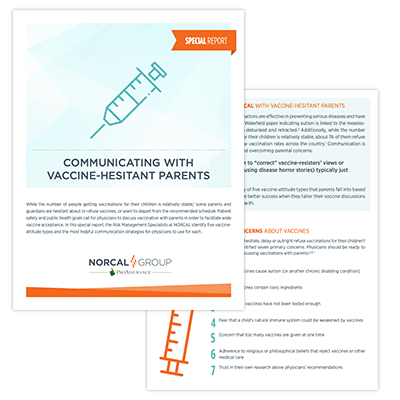In most states, adolescent patients have legal capacity to consent to substance abuse treatment. However, in a small minority of states, parents have a right to seek substance abuse treatment for their child, even when the child objects. Additionally, some states allow providers to notify the parents about treatment to which a minor has consented (or disclose information about the treatment), even without the minor’s consent to such disclosure.1 Consequently, consent for diagnosis and treatment associated with substance abuse should be handled carefully. Consider the following case.
Learn More »Adolescent Health Information Privacy
Adolescent privacy laws vary in significant ways from state to state and may conflict with federal laws.1 In addition to minor consent laws, clinicians treating adolescent patients should be familiar with state and federal medical information privacy laws as they relate to adolescent healthcare and should develop clear policies and protocols for appropriately protecting this confidential information.
Learn More »An adverse drug event (ADE) is defined as “harm experienced by a patient as a result of exposure to a medication.”1 The Institute of Medicine says an ADE is “an injury resulting from a medical intervention.”2 Like any adverse event, occurrence of an ADE does not necessarily indicate an error or poor quality care. However, adverse drug events account for nearly 700,000 emergency department visits and 100,000 hospitalizations annually.1
Learn More »While the number of people getting vaccinations for their children is relatively stable,1 some parents are hesitant about or refuse vaccines, or want to depart from the recommended schedule, yet patient safety and public health goals call for physicians to discuss vaccination with parents in order to facilitate wide vaccine acceptance. In this special report, NORCAL’s risk management experts identify the most helpful strategies for communicating with parents about vaccination.
Learn More »Patient engagement generally describes patient involvement in their own healthcare. The concept of patient engagement is not new; for example, diabetes educators have been talking about “shared decision making” since the early 1990s.1 It is still a current hot topic among policymakers, though, and is a key component of meaningful use legislation, the Affordable Care Act, and the U.S. Department of Health and Human Services’ National Strategy for Quality Improvement in Health Care. Additionally, increasing patient engagement can benefit you and your patients. Engaged patients are more likely to have better outcomes and greater satisfaction with their healthcare experience and are also less likely to file malpractice lawsuits.2
Learn More »





